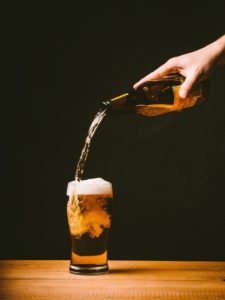By Aaron Boike, B.S. Kinesiology, A.C.E. Certified Personal Trainer
It’s an age old question that no one seems to quite have a definite answer to: “Can I drink alcohol and still lose weight?” In the developed world, alcohol accounts for about 10% of total energy intake in the average person. Although, there is a good degree of research on alcohols negative effects on the metabolism, epidemiological (population based) research does not seem to show a strong correlation between alcohol consumption and body weight, as the metabolic research may suggest.
Alcohol has been shown to decrease satiety, increase meal duration, and impair the bodies ability to burn fat for fuel in the hours following consumption. In addition, alcohol has a lot of calories! One gram of alcohol has 7 calories, more than protein (4 cals), carbohydrate (4 cals), but less than fat (9 cals). Research shows that when alcohol is consumed, it is given preferential treatment by the metabolism, getting burned off before carbohydrates, fats or proteins are utilized. The research also shows it is used as an energy source by the body, meaning that the calories count just like other macronutrients. (Jequier, 1999).
In the mid 1990’s the American Journal of Epidemiology did a population study on 7,230 adults 25-74 years of age to determine weight change for drinkers vs. non-drinkers. The study showed that over 10 years, the those who had at least one drink per day gained less weight than those who abstained from alcohol. This research suggested that low to moderate alcohol intake does not increase obesity risk. Another study published in 2010 on middle-aged and older women followed 19,220 women over 12 years to determine the effects of alcohol consumption on body weight. The study found that those who consumed a low to moderate amount of alcohol gained less weight and lower risk of becoming overweight (Wang et al., 2010).
One common factor in the research on alcohol consumption and body weight is that nearly all of the major studies have only followed those who drink a low to moderate amount. Moderate alcohol consumption is generally considered one drink a day for women and two drinks a day for men. Research on heavier alcohol use is difficult to obtain, as it can produce ethical challenges related to the health of study participants.
In conclusion, based on the research, it appears low to moderate alcohol consumption does not have a long term negative impact on bodyweight. Many nutritionists suggest that the biggest dangers of alcohol to those looking to lose weight is on impaired decision making in regards to food choices and the amount of food consumed. Poor food choices and a greater caloric intake will undoubtedly lead to weight gain. If you don’t drink, you certainly need not start to see weight loss success; however, for those who already consume a low to moderate amount of alcohol, you may not need to change your drinking habits to see weight loss success as long as you account for the calories consumed through alcoholic beverages.
Sources:
American Jnl of Epidemiology. (n.d.). Retrieved August 15, 2016, from http://aje.oxfordjournals.org/citmgr?gca=amjepid;140/10/912
Jaquier, E. (1999). The American Journal of Clinical Nutrition. Retrieved August 15, 2016, from http://ajcn.nutrition.org/content/69/2/173.full
Wang L, Lee I, Manson JE, Buring JE, Sesso HD. Alcohol Consumption, Weight Gain, and Risk of Becoming Overweight in Middle-aged and Older Women. Arch Intern Med.2010;170(5):453-461. doi:10.1001/archinternmed.2009.527.
